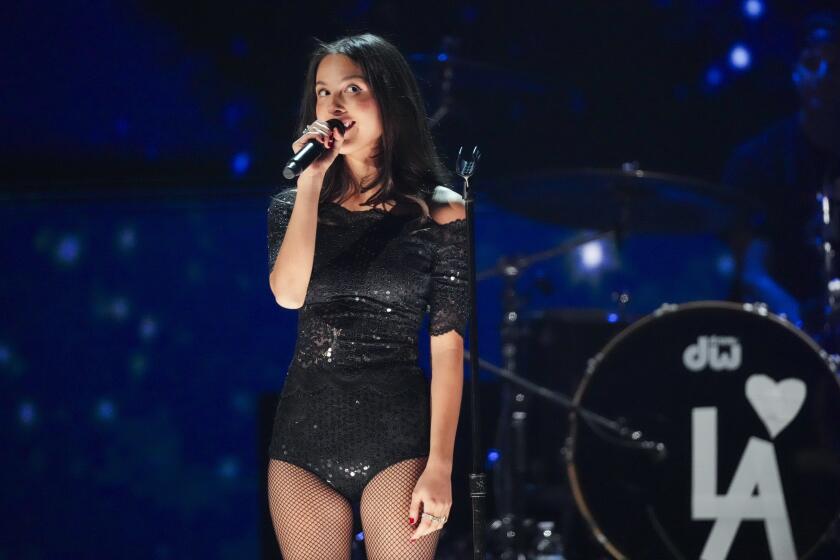Stand-Up With a Cultural Punch
- Share via
“I just got a Mexican Barbie. She comes with her own papers.”
“My parents left me at home and told me not to do anything they wouldn’t do. So I didn’t go out and get a job.”
Get it? Mexicans are typically illegal immigrants too lazy to hold a job.
Or, if they do work, they’re crammed into a pickup truck, nine-strong, puttering down the freeway in what one comic calls “the beaner lane,” on the way to their next gardening job.
Such ethnic stereotypes fly fast and loose during Latino showcases at the Laugh Factory, Comedy Store and Improv--niche comedy nights that feature the kind of easy slurs that somehow pass for punch lines when shared among the same race of people. Comedians from Jackie Mason to Richard Pryor have capitalized on this principle, but comics of every persuasion rarely reach that level of originality. On the Latino comedy scene, performers feel free to sprinkle in Spanish--but even freer to stereotype themselves.
The ranks of Latino nights can now add one more to their list, courtesy of longtime stand-up comedian Paul Rodriguez, who last week began his Paul Rodriguez Comedy Showcase and Salsa at the Conga Room in Los Angeles, Tuesday nights at 8.
The showcasing of Latino comics has taken various forms in recent years, from television series (HBO’s defunct “Loco Slam” and Galavision’s “Funny Is Funny,” hosted by comic Carlos Mencia) to a festival (the Latino Laugh Festival, held yearly in San Antonio).
The high-minded purpose behind these showcases is to give budding comics stage time and just maybe an entree into television, where Latinos are still woefully underrepresented, the most recent evidence arriving by way of a Temple University study that found Latinos make up 10.7% of the U.S. population and only 2.6% of the characters on prime-time television.
For Latino audiences, too, the clubs provide a service the networks won’t, which helps explain why Latino comedy showcases have become such a strong offshoot.
But if the shows are designed to bridge that gap between the club and the sitcom, some top performers nevertheless avoid them at all costs, feeling that, however well-intentioned, the shows ultimately do more career harm than good, bringing out the worst, most desperate comedy in the participants.
“It’s us doing our Amos ‘n’ Andy,” says comedian George Lopez. “It’s like we’re in our vaudeville stage.”
To Lopez, a 10-year veteran of the stand-up wars (not to mention the sitcom development merry-go-round), performing on Latino nights is tantamount to doing your act in a roomful of relatives; sure, everyone laughs, but it’s a much colder--and whiter--world out there in show business.
“When you perform in front of all-Latin crowds,” agrees comedian Mencia, “the more ethnic you get on them, the more they like you. It’s enticing. But what happens when you end up in Terra Haute, Ind., or Charlotte, N.C., where they don’t have a Latino radio station to market yourself on?
“We walk a thin line, we comedians of ethnicity,” Mencia adds. “We might be considered sellouts if we go in any one direction. We can be too Mexican or not Mexican enough.”
Rodriguez, currently best-known as the spokesman for the El Pollo Loco fast-food chain, has long been walking that thin line, enjoying mainstream success but also feeling the slings of fellow Latino comics who see his act as homogenized for the culture at large.
Rodriguez is familiar with the criticism; but stereotypes or no, he says, Latinos need shows like the one he hosts and produces at the upscale and roomy Conga Room, which is more than a cut above your given brick-wall comedy club.
Other Latino comics echo this sentiment, saying performers like Lopez and Mencia can afford to be critical of Latino nights because they have the stature to headline at clubs across the country. For the up-and-comers, shows at the Laugh Factory, Conga Room and Improv offer virtually unheard-of opportunities.
There can be no denying that Latino comedy showcases have at least helped build the base of comics working the clubs, if not spawned a breakout star. Jamie Masada, owner of the Laugh Factory, recalls that when he started Latino comedy nights at his club in 1984, he was desperate to find enough performers to fill a night.
“Any Latino who would come in, from my plumber to my electrician, [if] he said something funny I was telling them, ‘You could be a comic.’ ”
Today, the Laugh Factory’s Latino nights on Monday routinely pack in about 300 people, says Boomer Servantez, who has been hosting the show for 10 years. Servantez ticks off the names of Latino comics--from Johnny Sanchez to Carlos Oscar to Mencia--who have become household names, at least among a Latino fan base.
As potential sitcom stars, of course, the road is still much less traveled, something that continues to rankle the performers.
“The people who run the TV and movie industries, the majority of people who work in their houses as domestics are Latino,” says Lopez. “So they view us as a subculture. People don’t know the difference between a Latino comedian and the guy who cuts their grass.”
It should be noted that Latino nights aren’t the only form of niche comedy around town. In the face of the age-old notion that funny is funny regardless of the packaging, there are black comedy nights, gay comedy nights and all-female comedy nights; taken together, they amount to a kind of comedy polarization.
In part, such shows are a marketing ploy--a way to draw people into clubs by pitching them on politics or point of view.
“People call comedy clubs now and say, ‘Is he white? Is he black? Is he Latino?’ Instead of, ‘Is he funny?’ ” notes Mencia.
Guy Torry headlines Phat Tuesday, the African American comedy shows Tuesday nights at the Comedy Store.
“Since the riots, a lot of the industry weren’t going down to the ‘hood to see comedy,” he says, referring to former industry hot spots like the Comedy Act Theater in the Leimert Park area. “We brought the ‘hood to Hollywood.”
Rodriguez holds out high hopes for his Conga Room shows, which he says will play a more vital cultural role than the one-night-a-week Latino or black comedy nights at the mainstream clubs.
“None of these comedy rooms are owned by Latinos,” he says, referring to the fact that the Conga Room ownership group includes celebrities Jimmy Smits, Celia Cruz and Jennifer Lopez. In addition, Rodriguez says, he would like to see his comedy nights branch out to include poets and musicians, becoming a home for what Rodriguez calls the “Muppies”--Mexican American upwardly mobile people.
But even Rodriguez has some advice for those comics who might just use his club as a place to trade on easy stereotypes.
“There’s some guys out there who I have seen for two or three years--I know their first joke and their last joke. If you can go up on stage and do material that has nothing to do with Latino [culture] and it works, then I think it’s a lot better.”
Comedian Pablo Francisco, a regular on Fox’s “Mad TV” among other credits, puts it more succinctly: “If you’re funny, you get on stage. But if you’re Latino and not funny, those nights won’t make a difference.”
*
* Paul Rodriguez’s Comedy Showcase and Salsa, Tuesdays, 8 p.m., the Conga Room, 5364 Wilshire Blvd., (323) 938-1696. $10 general admission. $25 for VIP seating.
More to Read
The biggest entertainment stories
Get our big stories about Hollywood, film, television, music, arts, culture and more right in your inbox as soon as they publish.
You may occasionally receive promotional content from the Los Angeles Times.










